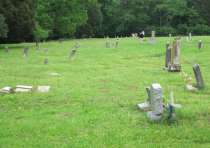
Runaway slaves, known as contrabands, attached themselves to the Union army as it moved through West Tennessee. Gen. Grant established a camp to provide care and relieve the army of the strain on its resources.
Gen. Ulysses S. Grant began his Tennessee campaign in February 1862 by defeating Confederate forces at Forts Henry and Donelson, followed by an overwhelming victory at the bloody Battle of Shiloh in April 1862, then set his sights on Vicksburg, Mississippi, with the aim of controlling the Mississippi River and splitting the Confederacy in two. Runaway slaves, known as contrabands, attached themselves to the army as it moved through West Tennessee. The overwhelming numbers of the contrabands slowed progress, exacerbated the spread of disease, and taxed resources. At the sleepy town of Grand Junction, Tennessee, (at the intersection of the Mississippi Central and Memphis-Charleston Railroads) Grant determined to establish a camp for the contrabands, freeing the army of the civilian burden. He named Chaplain John Eaton, Jr. Superintendent of Contrabands, and they selected Grand Junction as the location, both for its remoteness from major cities and the logistical advantage of the railroad for transportation of supplies and, when necessary, contrabands and soldiers. The refugees supplemented the small rations Eaton provided by growing crops, and used discarded military issue tents for shelter. Male refugees wore old military uniform articles, while women and children relied on donations from aid societies. A few Federal surgeons provided medical care, woefully inadequate in the face of camp diseases. Eaton brought in teachers to provide education and chaplains to officiate weddings. The refugees often found employment as farm hands on the many abandoned plantations in the area or as skilled laborers in nearby Memphis and Jackson. Some young men may have even joined the Federal Army through two regiments of United States Colored Troops in nearby LaGrange. The skills they learned at Grand Junction helped refugees immensely in their transition to freedom. Simple reading, writing, and math enabled them to form labor contracts during Reconstruction. The legalization of marriages while at the camp cemented their family structure, and they set out to reunite with lost family members. Camp command also helped secure employment in for refugees, who often assisted military officials and camp operations, provided labor for construction projects, or helped cultivate and harvest crops.
Tools
Key Facts
- Chaplain John Eaton, Jr. named Superintendent of Contrabands
- Grand Junction was chosen for its remoteness from major cities and the logistical advantage of the railroad for transportation of supplies
- Refugees supplemented the small rations by growing c




